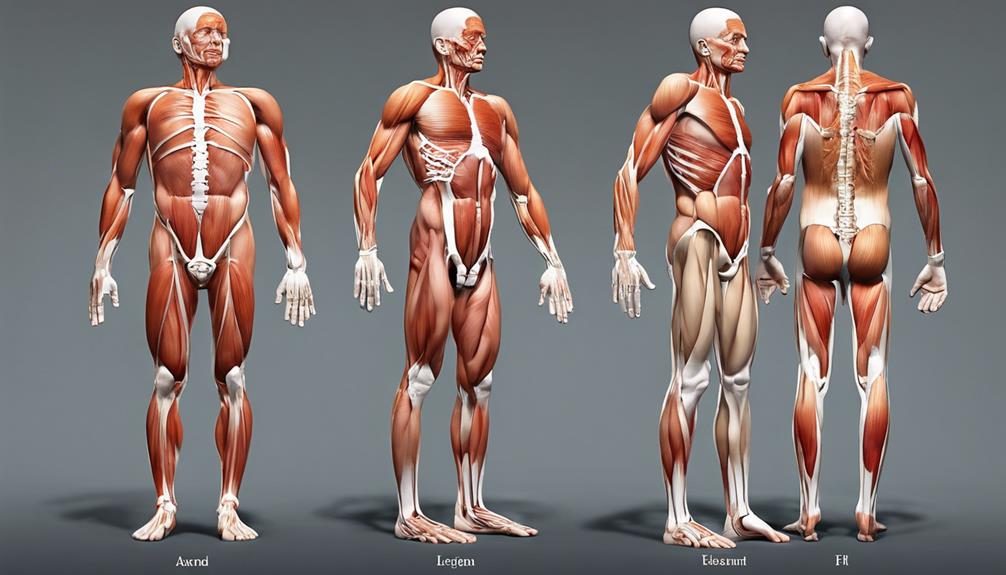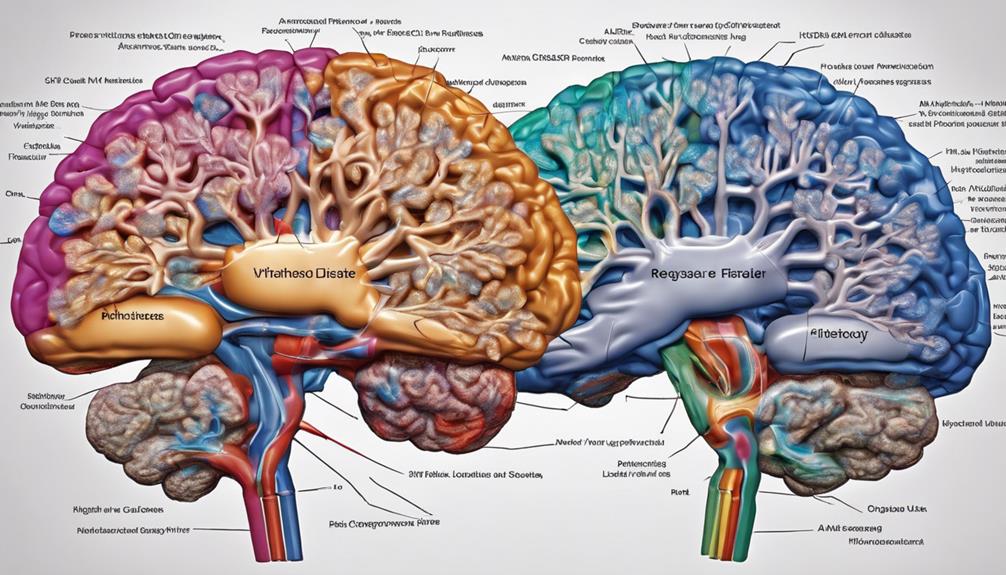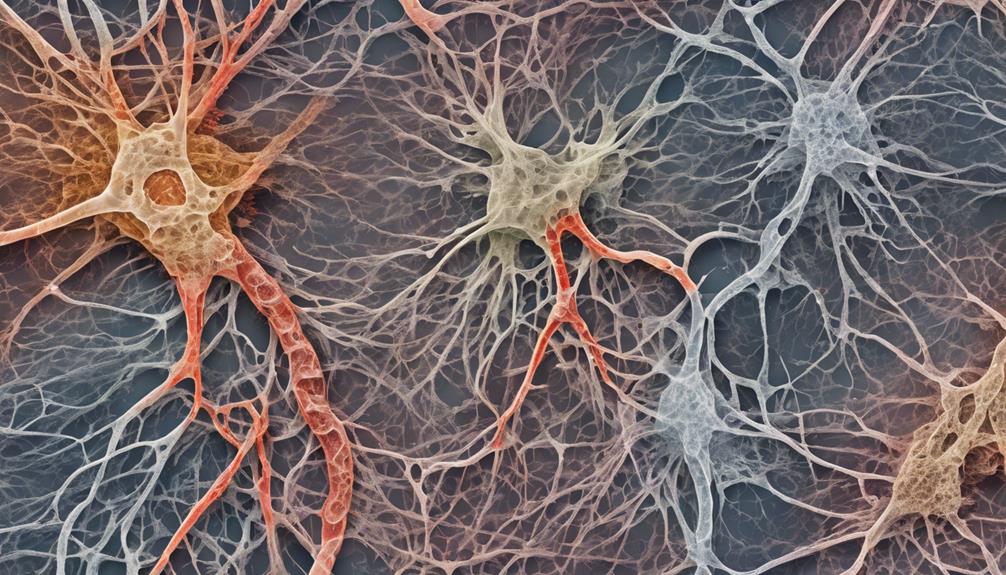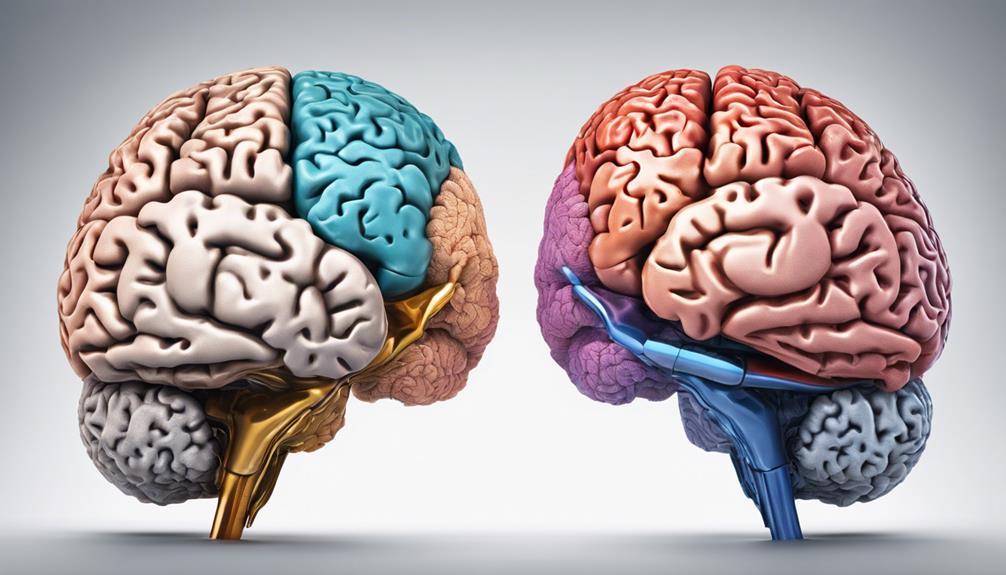As we delve into the complex world of neurodegenerative diseases, it is crucial to grasp the differences between ALS and Parkinson’s in order to enhance our comprehension.
Picture this: two seemingly similar conditions with vastly different impacts on the nervous system. One targets motor neurons, precipitating a decline in muscle function and control, while the other disrupts dopamine-producing neurons, manifesting in a spectrum of movement-related symptoms.
So, what sets these two apart beyond their symptomatic differences? Let's unravel the intricate web of intricacies that define ALS and Parkinson's, shedding light on their unique characteristics and implications for those affected.
Key Takeaways
- ALS progresses rapidly with severe disability; Parkinson's advances gradually often starting on one side.
- ALS focuses on muscle and nerve function evaluation for diagnosis; Parkinson's emphasizes dopamine levels and medication response.
- ALS treatment includes Riluzole, Edaravone, feeding tubes; Parkinson's treatment involves Levodopa, therapy.
- ALS leads to respiratory failure from muscle degeneration; Parkinson's impacts movement, speech with tremors and stiffness.
Symptoms of ALS and Parkinson's

How do the symptoms of ALS and Parkinson's differ in terms of manifestation and progression?
Both ALS and Parkinson's are neurodegenerative diseases, but they exhibit distinct symptoms and progression patterns.
In ALS, symptoms like muscle weakness, slurred speech, swallowing difficulties, and weight loss are common. On the other hand, Parkinson's symptoms include shaking, muscle stiffness, slow movements, balance issues, and emotional changes.
ALS typically progresses rapidly, leading to severe disability that affects basic functions like walking, talking, and breathing. In contrast, Parkinson's progression is more gradual, often starting on one side of the body and then spreading.
Genetic factors play a role in both diseases, but the manifestation of symptoms varies. While ALS primarily affects motor functions, Parkinson's presents with a combination of motor and non-motor symptoms.
Understanding these differences is crucial for accurate diagnosis and effective management of ALS and Parkinson's.
Diagnosis Disparities Between ALS and Parkinson's

In diagnosing ALS and Parkinson's, distinct methodologies are employed to differentiate between these neurodegenerative conditions. When comparing the diagnostic approaches for ALS and Parkinson's:
- ALS Diagnosis: Utilizes electromyography (EMG) and nerve conduction studies to evaluate muscle and nerve function. Additionally, ruling out conditions that mimic ALS symptoms, such as spinal cord compression or myasthenia gravis, is crucial for accurate diagnosis.
- Parkinson's Diagnosis: Involves assessing the patient's response to levodopa medication and conducting imaging tests like DaTscan to evaluate dopamine transporter levels. The presence of overlapping symptoms with other movement disorders such as essential tremor can make Parkinson's diagnosis challenging.
- Specialized Neurologists: Seeking out neurologists with expertise in movement disorders like ALS and Parkinson's is essential for an accurate diagnosis and effective disease management. Their specialized knowledge and experience play a vital role in distinguishing between these conditions and providing appropriate care.
Varied Treatment Approaches for ALS Vs Parkinson's

When comparing the treatment approaches for ALS and Parkinson's, distinct medication regimens and supportive care strategies are utilized to address the unique symptoms and progression of each neurodegenerative condition. In treating ALS, medications such as Riluzole and Edaravone are commonly used to manage symptoms and potentially improve survival rates. Supportive care for ALS often involves interventions like feeding tubes and mobility aids as the disease progresses, with a critical focus on maintaining quality of life.
Conversely, in Parkinson's disease, treatment includes Levodopa to increase dopamine levels and improve movement. Patients may also benefit from physical and occupational therapy to manage symptoms and enhance quality of life.
For ALS, the cause of death typically stems from respiratory failure due to the degeneration of respiratory muscles. In Parkinson's disease, the symptoms manifest in tremors, stiffness, and impaired balance, affecting movement and speech. Deep brain stimulation is a surgical option that can be considered for Parkinson's patients to alleviate symptoms and improve motor function.
Genetic and environmental factors play significant roles in both conditions, influencing the onset and progression of symptoms. ALS diagnosis relies on a combination of clinical presentation, electromyography, and exclusion of other conditions with similar symptoms. In contrast, Parkinson's disease is diagnosed based on the characteristic motor symptoms and response to medication.
Understanding the Causes Behind ALS and Parkinson's

Transitioning to the causes behind ALS and Parkinson's reveals the intricate interplay of genetic predisposition and environmental factors in shaping the pathogenesis of these neurodegenerative diseases. When delving into the origins of these conditions, it becomes evident that a complex combination of factors contributes to their development.
Here is a breakdown of the key causes behind ALS and Parkinson's:
- Genetic Mutations: ALS is associated with over 50 genes, primarily linked to RNA metabolism, which play a crucial role in the disease's onset. On the other hand, Parkinson's disease involves genetic mutations that affect dopamine-producing nerve cells in the substantia nigra region of the brain.
- Environmental Factors: In the case of Parkinson's disease, exposure to environmental factors like pesticides and metals can exacerbate the breakdown of nerve cells in the brain, further contributing to the progression of the disease.
- Interplay of Genetic Predisposition and Environmental Factors: Both ALS and Parkinson's disease likely result from a combination of genetic predisposition and environmental influences, highlighting the intricate nature of their pathogenesis within the nervous system. Understanding these causes is vital for developing effective management and potential treatment strategies for these debilitating neurodegenerative diseases.
Contrasting Pathology of ALS Versus Parkinson's

How do the distinctive pathological features of ALS and Parkinson's contribute to the understanding of these neurodegenerative conditions? In Amyotrophic Lateral Sclerosis (ALS), abnormal protein inclusions containing TDP-43, FUS, or SOD1 are implicated, leading to nerve cell damage. Conversely, Parkinson's disease is characterized by Lewy bodies, which are aggregates of α-synuclein protein found in the brain. Genetic inheritance plays a crucial role in familial ALS cases, while specific genes like SNCA, LRRK2, VPS35, Parkin, PINK1, and DJ-1 contribute to Parkinson's disease. The prevalence of ALS in the US is approximately 7.7 cases per 100,000 individuals, whereas Parkinson's had an estimated 6.1 million patients globally in 2016. Ongoing research is exploring the relationship between ALS pathogenesis and the gut microbiome, aiming to enhance our understanding and identify potential treatment avenues for ALS.
| Feature | ALS | Parkinson's |
|---|---|---|
| Pathology | Abnormal protein inclusions with TDP-43, FUS, or SOD1 | Lewy bodies composed of α-synuclein protein aggregates |
| Genetic Inheritance | Significant role in familial cases | Genes like SNCA, LRRK2, VPS35, Parkin, PINK1, DJ-1 |
| Prevalence | ~7.7 cases per 100,000 in the US | Estimated 6.1 million patients globally in 2016 |
Frequently Asked Questions
What Are the Similarities and Differences Between Parkinson's Disease Multiple Sclerosis and Amyotrophic Lateral Sclerosis?
We'll outline the similarities and differences between Parkinson's Disease, Multiple Sclerosis, and Amyotrophic Lateral Sclerosis. Each condition affects the nervous system differently, leading to distinct symptoms and progression rates. Understanding these variances is crucial for accurate diagnosis and treatment.
What Are the Key Differences Between ALS and Ms?
We will highlight key differences between ALS and MS. ALS impacts motor neurons, causing muscle atrophy and breathing issues with a 3-10 year life expectancy post-diagnosis. In contrast, MS targets myelin, leading to limb weakness, vision problems, and fatigue.
Is There a Relationship Between Parkinson's Disease and Als?
There isn't a direct link between Parkinson's and ALS. Parkinson's affects dopamine neurons, while ALS impacts motor neurons. Despite both being neurodegenerative, they differ in symptoms and progression. Genetic mutations in distinct genes underlie their separate pathologies, necessitating precise diagnoses and treatments.
How Can You Tell the Difference Between MS and Parkinson's?
We distinguish MS from Parkinson's through assessing symptoms and affected nerve cells. MS involves myelin damage causing limb weakness and vision issues, while Parkinson's impacts dopamine-producing neurons, leading to tremors and slowed movements. Understanding these distinctions aids accurate diagnosis.
How Does Harrison Ford’s Experience with Parkinson’s Compare to ALS?
Harrison Ford’s battle with Parkinson’s facts stands in contrast to ALS in many ways. While Parkinson’s primarily affects motor skills and movement, ALS impacts nerve cells throughout the body. Ford’s diagnosis has raised awareness about Parkinson’s, shedding light on the importance of early detection and treatment.
Conclusion
In conclusion, the distinct differences between ALS and Parkinson's disease highlight the importance of tailored treatment approaches for each condition.
By understanding the unique symptoms, diagnosis methods, and underlying causes of these neurodegenerative diseases, healthcare providers can offer more effective care to patients.
Stay tuned for future research developments that may uncover new insights into the contrasting pathology of ALS and Parkinson's, leading to improved management strategies and potential breakthroughs in treatment options.









